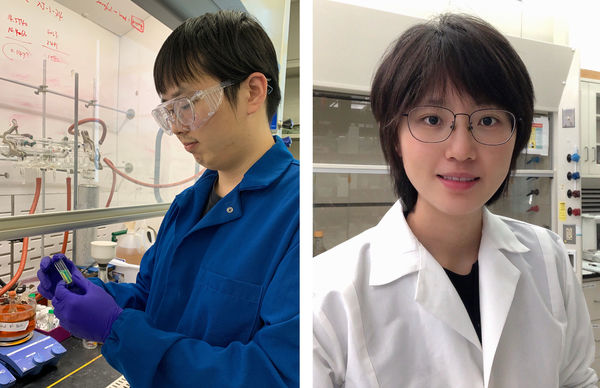

Two graduate students at the University of Notre Dame are the inaugural recipients of fellowships for the Materials Science and Engineering Doctoral Program. Each fellow will receive a stipend for one year to support their research and dissertation as part of the new doctoral program that launched in 2020.
“It is a great pleasure to see these first fellowships go to two outstanding Notre Dame graduate students, one from the College of Science and one from Engineering,” said Alan Seabaugh, Frank M. Freimann Professor of Electrical Engineering, director of Notre Dame Nanoscience and Technology (NDnano), and executive committee chair of the Material Science and Engineering Doctoral Program. “We look forward to seeing their material innovations flourish, as we write proposals and expand external funding of materials research at Notre Dame.”
The inaugural fellowship recipients for the doctoral program are:
Xiuyu Jin, doctoral student studying chemistry, for research titled, “Dispersing perovskite quantum dots in water: Enhancing stability by encapsulation in nanoparticles.” The research aims to develop a polymer nanoparticle platform that can encapsulate Perovskite quantum dots (PQD) for protection. The ultimate goal is to develop a hybrid particle platform with several PQDs for diagnostic sensors. Jin is advised by Haifeng Gao, associate professor and director of graduate admissions in the Department of Chemistry and Biochemistry at Notre Dame, and Na Wei, associate professor in the Department of Civil and Environmental Engineering and Earth Sciences at Notre Dame.
Lan Li, doctoral student studying bioengineering, for the project, “Methacrylate modified nanoparticles for imaging photopolymerized hydrogels and scaffolds.” Bioengineered constructs have demonstrated tremendous potential in tissue regeneration, but clinical applications have been restricted by a lack of functional vasculature, poor integration, and ineffective methods of longitudinal monitoring. To address these constraints, Li and her advisers are investigating methacrylate-modified nanoparticles that can be integrated in 3D bioprinting of photopolymerized hydrogels to enable noninvasive, longitudinal tracking of in vivo function using photon-counting computed tomography. Li will be advised by Ryan Roeder, professor in the Department of Aerospace and Mechanical Engineering at Notre Dame, and Vahid Serpooshan, assistant professor in the Wallace H. Coulter Department of Biomedical Engineering at the Georgia Institute of Technology.
To learn more about materials science and engineering at Notre Dame, the interdisciplinary doctoral program, and the fellowships, please visit nano.nd.edu/materials-science.
Contact:
NDnano / University of Notre Dame
MSE-list@nd.edu / 574.631.0279
About Notre Dame Research:
The University of Notre Dame is a private research and teaching university inspired by its Catholic mission. Located in South Bend, Indiana, its researchers are advancing human understanding through research, scholarship, education, and creative endeavor in order to be a repository for knowledge and a powerful means for doing good in the world. For more information, please see research.nd.edu or @UNDResearch.
Originally published by at nano.nd.edu on October 16, 2020.